Kidney disease patient uses social media to help others
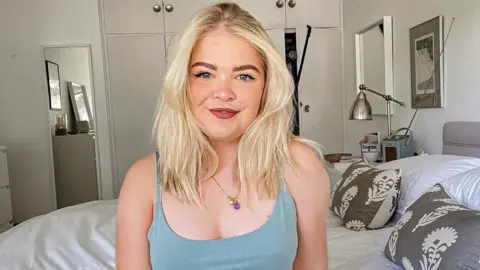 Hattie Stiff
Hattie StiffWhilst many use social media to share their highlights in life, Hattie Stiff is going against the norm.
The 27-year-old, who has lived with kidney disease her whole life, is using her platform to raise awareness of the condition and chronic illnesses, as well as their impact.
Whether it's medical appointments, dialysis, or a transplant, Ms Stiff has opened up about her reality - both the good and bad - to her online community of 33,000 followers.
"I realised that this was going to be such a large part of my life and I couldn't hide it," Ms Stiff said.
"I also didn't want to hide it - it's a big part of me, and although it's not everything about me, it's something I am proud that I've gone through."
After receiving her first kidney transplant at the age of two-and-a-half, Ms Stiff was able to live a relatively "normal" life, until the donated organ began to lose function in 2019.
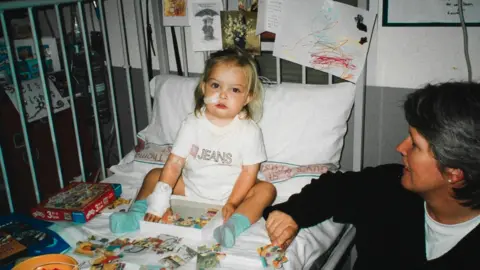 Hattie Stiff
Hattie StiffMs Stiff, who is originally from Dorset but now lives in Wincanton, was in her final year at Bath Spa University when she began weekly dialysis treatment - something which she described as "one of the hardest things" to go through.
She struggled physically, with the treatment causing high blood pressure and anaemia. She also suffered two minor strokes, which were likely caused by her blood pressure.
Mentally, Ms Stiff said she felt "quite isolated" throughout the experience - she was often the youngest person in the room.
"Being younger and being in those dialysis units, it makes you think 'why am I broken?'
"I know being 'broken' is a horrible way to look at it, but when you're in that place, it does feel like that," she said.
When she realised that there would likely be other young people in similar situations feeling the same way, she decided to open up about her experience on Instagram in a bid to connect with fellow patients.
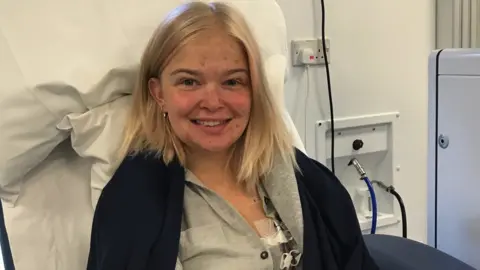 Hattie Stiff
Hattie StiffOver the course of two years, Ms Stiff posted photos and videos detailing the journey leading up to her second transplant, alongside her usual posts about fashion and lifestyle.
Her health posts gained traction, and led to many people reaching out to discuss kidney disease and other chronic illnesses.
Ms Stiff said some could relate directly to her experience, whilst others were able to develop a deeper understanding of the condition.
"It was a positive side of social media that I had not necessarily known had existed beforehand.
"The more I posted and the more I shared, the more people cared and found it useful.
"It's been amazing to create a community online," she added.
After four cancelled operations, Ms Stiff finally received a new kidney from her dad at Southmead Hospital in July 2021.
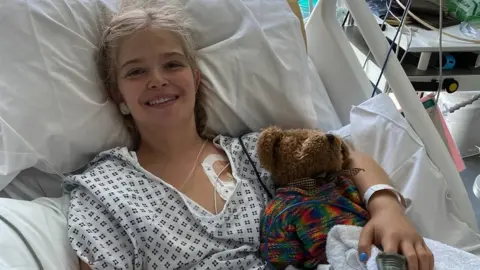 Hattie Stiff
Hattie StiffSince November 2021, Ms Stiff has worked as an ambassador with the National Kidney Federation (NKF) to help raise more awareness of kidney disease in the media, particularly amongst young people.
As a charity ambassador, she has participated in webinars, fundraisers and an ITN documentary which was launched at Parliament.
"There are so many different types of chronic illnesses and it's almost impossible to check a box and account for every single one in the media, but I do think there should be more about dialysis and about transplants.
"It doesn't just affect you at the time that you're having it - it can affect you in work, in your personal life, your relationships… it's a very big, life changing thing and those changes to your life continue after your transplant," she said.
"Your transplant is not a cure. It's almost like a band aid treatment until that kidney stops working.
"You will still have kidney disease and I think that's quite a big misconception."
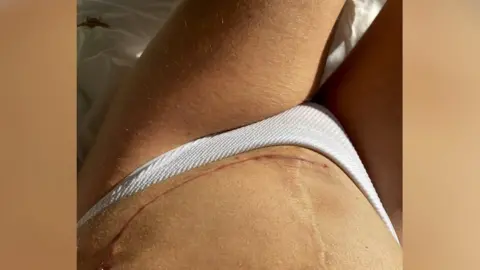 Hattie Stiff
Hattie StiffWorld Kidney Day is marked every March. The annual global health awareness day was created by a group of kidney charities, including the NKF.
The international campaign is designed to highlight the importance of the kidneys and to raise awareness of conditions which can impact them.
According to the NHS, chronic kidney disease is a common long-term condition where the kidneys do not work as well as they should. It can affect anyone, although it is more common in elderly people.
The condition can get progressively worse and can lead to kidney failure.
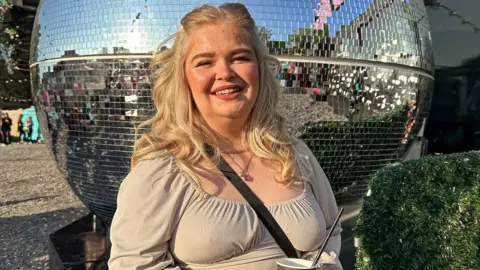 Hattie Stiff
Hattie StiffAlmost three years on, Ms Stiff is continuing to share updates on her health.
She said: "If you look at me, it doesn't look like there's anything wrong with me.
"If I could have had someone similar to myself going through it and seen their journey, I think that would've given me a lot of hope.
"Especially when things were not going well - those were the times where I felt like a very unlucky person.
"I always want other people to feel happy within themselves and their chronic illness journey, and have confidence in standing up for themselves when dealing with doctors and medical treatments.
"If I can help even one person by sharing my story, then all the hardship was worth it."

Follow BBC Somerset on Facebook and, X. Send your story ideas to us on email or via WhatsApp on 0800 313 4630.
